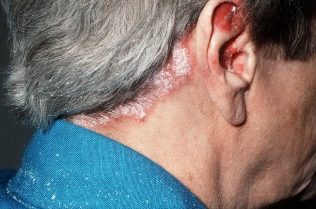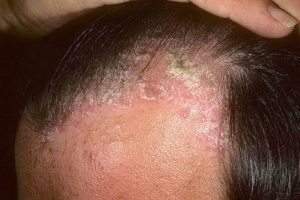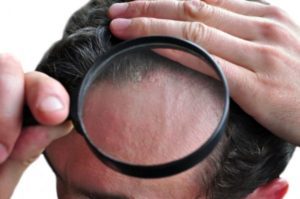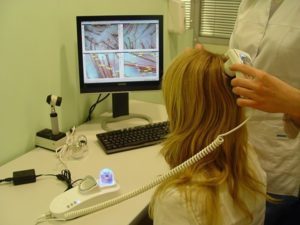Psoriasis is a chronic, non-infectious, inflammatory skin lesion that has a negative impact on the patient's quality of life ("Psora"-grade in Greek). Like many other diseases, it was from there that the first findings about psoriasis were described. This term was coined by Galen, one of the key researchers in the medical field.
The skin symptoms of psoriasis caused confusion between people and doctors because leprosy was very common at the time and the consequences were disastrous. Psoriasis patients are under social pressure and should be avoided. They must be isolated. In Europe, such people are forced to ring bells to warn others. Try to use feces, onions, sea salt, oil, and urine for treatment, but all methods are ineffective, and patients with psoriasis are eliminated.

Prevalence of psoriasis
The disease can appear at any age, but it is more common in the 49 to 69 age group. According to reports, the prevalence of psoriasis in various countries is between 0. 09% and 11. 4%, which makes psoriasis a serious global problem.
Although it is generally misunderstood that psoriasis is not as serious as other non-skin diseases, psoriasis can cause a disease burden that extends far beyond skin disease symptoms. Its psychological effects are similar to cancer, heart disease, and diabetes. Psoriasis plaques are usually visible and can negatively affect relationships, school or work success. Not surprisingly, patients with psoriasis have a higher incidence of depression and an increase in suicidal thoughts.
Psoriasis patients are also at risk of serious comorbidities, which will complicate disease control and increase the risk of early death. Cardiovascular disease and metabolic syndrome are more common in patients with psoriasis.
In addition, psoriasis itself is a risk factor for cardiovascular disease, which is three times the relative risk of developing myocardial infarction. Severe psoriasis is also associated with an increased risk of death. Compared with people without psoriasis, the life expectancy of men and women is reduced by 3. 5 years and 4. 4 years, respectively.

Causes of psoriasis on the head
There are many theories about the origin of psoriasis. This is due to microbes, viruses, allergies, poor sanitation, the blood supply of the skin is disturbed, and the balance of internal organs is disrupted. When human immune cells attack their own tissues, the autoimmune nature of this disease is currently the most urgentSituation one. Even this hypothesis is still a theory, because so far, no skin-damaging antibodies have been found in psoriasis patients.
Currently, the pathological cause is unclear. But in the process of research, scientists have established factors that can induce psoriasis to a certain extent.
Distinguish the following points:
- Heredity. Even if the mother and father are sick, their children do not have a 100% chance of getting psoriasis. But in this case, the risk of suffering from this pathology is higher. It should also be noted that if one of the identical twins is sick, the probability of the second twin being sick is higher than the normal risk in the population. This proves that this disease has a genetic premise.
- Skin injuries: accidental cuts, cat scratches, mosquito bites, sunburns, increase the risk of recurring outbreaks.
- Infection: Staphylococcus, streptococcus and other infections can also be used as triggers. Children usually have streptococcal tonsillitis before the onset of skin psoriasis.
- Some drugs can cause diseases, such as anti-malaria drugs and certain antidepressants.
- Changing your HIV status to positive can also cause psoriasis. Therefore, it is not surprising that HIV testing is performed when psoriasis is suspected.
- Stress. The most famous trigger for laymen. "It's all caused by stress"-every psoriasis patient has heard this phrase at least once. Some people doubt this term, but it has its rationality. Scientists believe that our immune system can cope with emotional and mental stress, as well as physical defects such as trauma and infection.
- Smoking. It has long been pointed out that it is no secret to anyone that cigarettes have a negative effect on skin conditions. Therefore, it is easy to cause psoriasis, especially damage to the head and hands.
- Alcohol is one of the common individual triggers of psoriasis.
- Hormonal changes. The disease usually manifests in adolescence. Menopause can also cause psoriasis, but during pregnancy, the plaques decrease or even disappear completely.
Symptoms of psoriasis on the head
In 50% of cases, psoriasis will be felt from the head. Psoriasis can appear anywhere on the head. Sometimes small patches are formed that are easy to hide in the hair, but when the entire scalp is covered, it is difficult to cover up the patches.
The appearance of psoriasis on the head will be as follows:

- Red spots on the scalp. Due to their fading, some spots may be almost invisible, but there are also some bright red elements that are easy to see.
- Scales can peel off the psoriasis skin. In this pathology, the condition of the scalp may resemble ordinary dandruff. However, for example, there is a difference in psoriasis, a silvery luster is observed, and it may be accompanied by itching.
- Dry scalp. The scalp may be so dry that the skin ruptures and bleeds, which will create conditions for increased infections. Treatment in this location is difficult.
- Itching. This is one of the most common symptoms. Some people will feel a slight itching, the patient may forget it in daily activities, and some people will experience severe itching that makes it impossible to work, study or even sleep.
- Bleeding. Since scalp psoriasis may be itchy, the patient may scratch the skin and damage the skin. In addition to bleeding, scratching can make the plaque bigger and denser, which can worsen the condition of psoriasis. This is why dermatologists tell their patients "don't hurt the scalp".
- Burn. The patient may describe his scalp as "burning. "
- Hair loss. Scrubbing the scalp and descaling hard can cause hair loss. Although this phenomenon is temporary, it may still cause inconvenience to patients.
These clinical manifestations can rapidly increase and collapse. This is a separate process. In one patient, the entire pathological process will end on a light spot under the hair, while in another patient there will be many bright foci on the entire top of the head. This is especially affected by the above mentioned triggers.
Many problems that patients may face:
- Skin performance visible to others. Psoriasis can make people shy. Any aspect of social life may cause pressure on these people, such as holding hands on dates.
- Finance. Treating psoriasis can be expensive. This is especially true for psoriasis, which is widely resistant to conventional therapies, for which new drugs based on monoclonal antibodies are used.
- Pain. Psoriasis causes chronic pain, which further increases stress levels. This is especially true when skin manifestations are combined with joint inflammation while reducing one’s daily activities.
- Heal. Especially when the patient seeks help late, some procedures cannot achieve the expected results, which of course will make the patient feel worried and pressure him emotionally. Other processes may take a long time. For example, you may need to receive light therapy 3 times a week, up to a year. For some people, such a system is difficult to adapt to the standard pace of life.
- Suffer from chronic diseases. Psoriasis, like many other chronic diseases, requires tremendous effort. For the patient, especially in the early stages, it is difficult to deal with many other problems of "falling on his head". This creates conditions for the occurrence of depression.

Diagnosis of psoriasis on the head
The decision to see a doctor depends on the severity of the patient’s symptoms. However, regardless of the location of the plaque, the best solution is to see a doctor. In order for further treatment to be as successful as possible, an accurate diagnosis must be made even if the symptoms are mild.
In most cases, scalp psoriasis can be diagnosed after physical examination and medical history analysis.
Dermatologists can determine scalp psoriasis by examining the pathological factors of the skin.In special circumstances, patients may be advised to undergo a skin biopsy to rule out other diseases.
Treatment of head psoriasis
Unfortunately, there is currently no cure for this disease. Treatment is needed throughout the life to maintain remission. In addition, caring for patients with psoriasis not only requires skin treatment, but it is also very important to control existing chronic diseases and prevent new diseases.
These conditions will include cardiovascular disease, metabolic disease and mental health.
Treatment goals:
- Achieve clinical rehabilitation of patients as soon as possible;
- Remission must be stable and long-term;
- Maintain the patient's positive mental state.
Diet
Traditionally, treatment begins with diet. Foods containing antioxidants, such as vitamin C, E, beta-carotene (vegetables, fruits, sage, ginger, etc. ), and omega-3 fatty acids rich in salmon, sardines and other fish can all play a positive role.
The link between alcohol and psoriasis is unclear, but experts say that people who drink less alcohol respond to treatment, and the relief of psoriasis will continue after quitting. In addition, certain antipsoriatic drugs are incompatible with alcohol.
There is a clearer correlation betweenand overweight. Generally, in obese people, the pathology progresses faster and the clinical situation is brighter.
Shampoo
Hair makes the treatment of scalp psoriasis particularly difficult. Few people agree that hair loss can more effectively address the clinical manifestations of the disease, especially considering the fact that the defect will be more obvious to others.
Traditional hair care products are not suitable for this situation because they will additionally irritate the scalp and lead to pathological development. Therefore, tar shampoos are used, which have been effective in fighting scalp psoriasis for a long time.
Tar has a "soothing" effect on the epidermis of the scalp and inhibits the formation of scale. In addition, shampoos with phenolic acid are used because of their keratin-solubilizing effect (destroying dense keratinous scales). Plus is used to enhance the permeability of other drugs (including corticosteroids).
When prescribing shampoo, one’s personal hygiene should be considered. For example, some women do not wash their hair every day, so it is best to wash their hair 2-3 times a week, and then wash their hair in the morning.
Phenolic acid
Phenolic acid can also be used alone as an ointment. The fact that the ointment is applied for a relatively long time increases the effectiveness of its super-corneal properties. For patients who complain that the hair is difficult to separate the scales, applying ointment before showering can help solve this situation.

Coal pitch
Coal tar has been used for the treatment of psoriasis for decades due to its anti-proliferative, anti-inflammatory and powerful antipruritic effects.
Although, raw coal tar is the most effective resin. Applying raw stone tar to the scalp is problematic. It is usually recommended to use a resin solution (5-20%) formulated as an emulsion or added to corticosteroids. This therapy helps fight psoriasis, but it has many side effects: hair coloring, thinning hair and a more serious negative effect-carcinogenicity, thus limiting the use of this method.
For example, for this reason, Canada and the European Union prohibit the use of coal tar.
Corticosteroids
Among all available topical treatments, corticosteroids have been proven to be the most effective in clinical trials for scalp psoriasis, and are the most commonly prescribed treatments. Corticosteroids are also very convenient, because in any case there are a large number of production forms: creams, lotions, ointments, oils, gels, foams, solutions, sprays and shampoos.
In this pathology, please do not underestimate the importance of psychological harmony. Stress can trigger, cause detailed clinical conditions, and inhibit the treatment process. Therefore, patients with internal anxiety are advised to consult a psychotherapist and psychologist.
Care advice for head psoriasis
For patients with psoriasis, it is important to follow the doctor’s advice first, but by following the simple rules described below, you can further improve the quality of life:
- Use moisturizing lotion. When the skin is dry, the skin manifestations of the disease deteriorate significantly, so it is important to keep the skin moist. Special cosmetic ointments, lotions or ordinary petroleum jelly can help solve this problem.
- Psoriasis plaque can protect the skin. When washing your hair, do not forcefully peel off the scales that are close to your skin, as this can only spread them into nearby healthy tissues.
- Be careful when trimming your nails. Describes the accidental damage to the nail growth area with manicure scissors, resulting in the appearance of new skin components.
- Find the right shampoo for you, it will not loosen your scalp and can relieve symptoms. Or just continue to use tar with lower tar content for daily care.
- Climate can also play a role. Note that colds have a negative impact on the patient, leading to the development of plaques. Sunny days can cause deterioration of skin performance, but not always.
- Use a humidifier. This keeps the skin moisturized and eliminates dry air that is unfavorable for psoriasis patients.
- Do not take drugs that can harm your skin. You should tell your doctor about any medicines you are taking, even medicines that you think are harmless. For example, for depression, lithium-containing preparations can be used, which is contraindicated for psoriasis patients.
- Avoid all kinds of damage to the skin: scratches, cuts, bumps. Skin injuries can lead to a condition called Koebner's phenomenon (when psoriasis elements develop along the damage to the skin). Be careful when shaving. Try to avoid acupuncture, avoid getting tattoos on the body, and do everything possible to prevent insect bites.
- Try to appear in the sun, but in moderation. Ultraviolet rays under the sun will slow down the growth of skin cells, so getting the right amount of ultraviolet rays is beneficial (30 minutes at a time is enough). Paradoxically, excessive exposure to the sun can cause psoriasis. Also, remember that certain medicines can make your skin more sensitive to UV rays.
- People with psoriasis should reduce their anxiety. Of course, this is easier said than done, but you can try relaxation techniques such as meditation or yoga.
- Estimate how much alcohol you have drunk. The link between alcohol and psoriasis is unclear, but scientists still believe that alcohol can exacerbate symptoms, especially in men. It is well known that the combination of alcohol and certain psoriasis drugs can be dangerous.
- Eat a balanced diet and try to lose weight. If it is difficult for you to do this on your own, please seek the help of an expert who can assess which direction is worth working better.

Headshot control suggestions
By monitoring the progress of psoriasis, it can help patients better control the disease and take necessary measures in time, and improve the productivity of the doctor-patient relationship. Some simple rules can help you:
- Create a "self-portrait" of a psoriasis outbreak. A digital camera, smart phone or a piece of paper can all help you, where you can record all changes that occur to the plaque. It is also worth recording where the changes first appeared and the sequence of changes. For this introspection, the doctor will only praise you and will know your determination. Over time, by analyzing records, regular conditions can be identified, for example, plaques that always start from the occipital bone.
- Every time psoriasis subsides or progresses, try to find out what it is. Maybe the weather has changed? Is it myrrh? Are you taking a new medicine? Recently damaged skin? Such triggers can be individual, which makes it difficult for doctors to understand without introspecting the patient (for example, a seizure causes a certain type of coffee).
Although the disease is not spread through contact, the patient's appearance makes those who don't know feel scared. Beauty salons are afraid to provide services. Some taxi drivers do not want to transport such people, and it is difficult to find jobs. Not to mention starting a family, because they are worried that their children will be destined to suffer the same suffering and therefore cannot bear children.
even described the refusal to train psoriasis patients in the Olympic Swimming Reserve due to collective complaints from other athletes. Although they fully understand that this pathology is not contagious, the management still rejected these people.
Due to heavy psychological pressure and the need for interpersonal communication, it is difficult for them to carry out daily activities. For these reasons, societies that protect and support psoriasis patients have been formed in many countries. Companies are deploying to educate outsiders about this disease.
People should judge by their behavior, not by their appearance. Indeed, among patients with this morbidity, there are very professional doctors, police officers, firefighters, athletes and many others whose actions take pride in not only their relatives but also their country.























